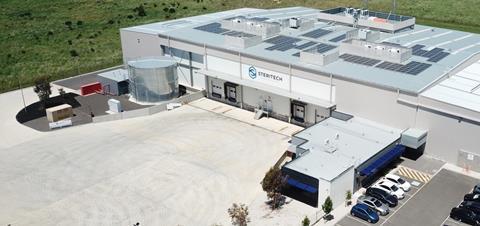Investment will double the irradiation capacity at the Steritech X-ray facility boosting biosecurity protections and enhancing trade opportunities for fresh produce

The federal government has announced it will inject A$5.3m of investment to more than double treatment capacity at the Steritech X-ray site in Melbourne’s north. The expansion will help ensure continuity of trade as industry looks to manage current and future pests such as fruit fly.
Ben Reilly, Steritech’s fresh produce business manager, said the investment represented a new milestone for the use of X-ray technology as a phytosanitary measure for fresh produce, an application that Australia is leading globally.
“Irradiation is a generically effective solution for treating any insect at any temperature. The treatment has already been critical to maintaining trade following at least one foreign pest incursion and the suspension of several alternate pathways,” said Reilly.
“The grant has helped Steritech bring forward a significant investment in increased capacity for future scenarios. It will help ensure idle capacity is available to industry in the moment of need, not two or three years after it.
‘The cost of X-ray equipment has almost tripled in the past five years. The government’s investment has been critical to realising this project.”
Reilly said expanding irradiation capacity was important as the Australian fresh produce industry continues to navigate changes in domestic biosecurity. It would also enhance Australia’s export offering.
“We are seeing changes in Australia’s domestic biosecurity. How will growers continue to supply interstate markets and meet evolving biosecurity requirements? How will we continue to ensure healthy and affordable produce choices for all Australian consumers?” said Reilly.
“At the same time, we are looking at the long-term needs of Australian exports. How can Australian produce be delivered faster, fresher and more sustainably? Irradiation treatment has a valuable role to play in addressing all of these questions.”

Federal minister for agriculture, fisheries and forestry, Murray Watt, said the expansion will help safeguard Australian horticulture’s position in overseas markets by ensuring fresh produce is always export-ready.
“Strengthening our biosecurity protections is one of the Albanese government’s key priorities for our agriculture sector, and expanding irradiation facilities means more Aussie fruit will reach more consumers around the world,” Watt said.
“Current forecasts from ABARES indicate that Australia is set to produce over A$17bn of horticulture next financial year, and roughly half of it is susceptible to fruit fly. It’s important we support the sector to strengthen its resilience against the pest and assist in getting product to market.
“Helping protect the horticulture sector from fruit fly impacts reduces costs throughout the supply chain from growers right through to the supermarket shelf.”
Victorian minister for agriculture Ros Spence said Victoria is a leader in using irradiation technology for modern biosecurity treatment of fresh produce.
“The existing X-ray facility in Melbourne services over 80 Australian fresh produce crops that are exported to markets like New Zealand and Vietnam,” she said.
“By adding capacity we will boost trade security for the horticultural industry and increase the availability and affordability of fresh Aussie-grown produce, on dinner plates around the world.”
This funding is being delivered under the A$30m Building Resilience to Manage Fruit Fly programme, which aims to support our horticulture industries and regional communities fight back against the ongoing impacts of fruit flies.



